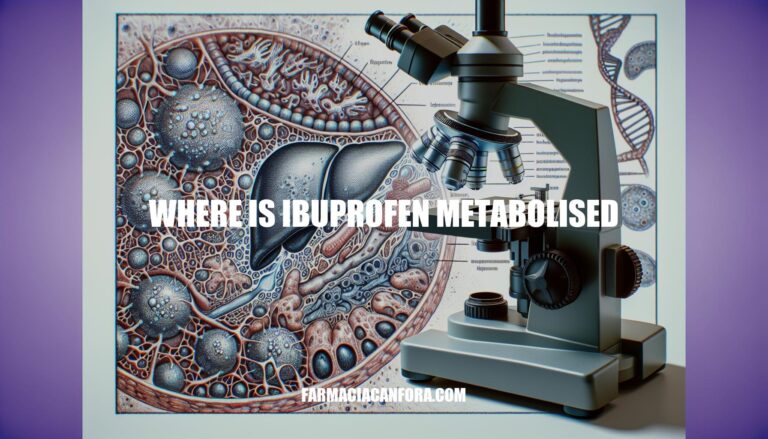


Understanding where ibuprofen is metabolized in the body is crucial for optimizing its therapeutic effects and minimizing potential side effects. Ibuprofen is primarily metabolized in the liver, where it undergoes extensive processing before being excreted by the kidneys. This knowledge helps in tailoring dosages, especially for individuals with liver or kidney impairments, ensuring safe and effective use of the medication.
Ibuprofen is primarily metabolized in the liver. Here’s a step-by-step breakdown of the process:
This process ensures that ibuprofen is broken down and removed from the body efficiently.
: DrugBank
: UC Davis
The liver plays a crucial role in the metabolism of ibuprofen, primarily through the cytochrome P450 enzyme system. The key enzyme involved is CYP2C9, which oxidizes ibuprofen into its metabolites. Here’s a detailed breakdown:
These metabolic processes ensure that ibuprofen is effectively broken down and eliminated from the body.
When ibuprofen is metabolized, the primary metabolites formed are:
These metabolites are significant because they help in the elimination of ibuprofen from the body and can influence the drug’s overall efficacy and safety profile.
: Ibuprofen: pharmacology, efficacy and safety
: Mechanisms of Inflammation and Sites of Action of NSAIDs
: Dissecting the reaction of Phase II metabolites of ibuprofen and other NSAIDs
Ibuprofen is metabolized primarily in the liver, producing two major metabolites: hydroxyibuprofen and carboxyibuprofen. These metabolites are then excreted mainly through the kidneys. The kidneys filter these metabolites from the blood, and they are subsequently excreted in the urine. This renal excretion process involves glomerular filtration, tubular secretion, and reabsorption. The efficiency of this process ensures that ibuprofen and its metabolites are effectively removed from the body, maintaining homeostasis and preventing potential toxicity.
Ibuprofen is primarily metabolized in the liver, where it undergoes extensive processing by enzymes called cytochrome P450 (CYP) enzymes, particularly CYP2C9. This knowledge is crucial for optimizing therapeutic effects and minimizing potential side effects, especially for individuals with liver or kidney impairments.
The liver’s metabolic process involves absorption, enzymatic action, conversion, conjugation, and excretion of ibuprofen metabolites, which are then eliminated through the kidneys in the urine. Understanding this process ensures safe and effective use of the medication.